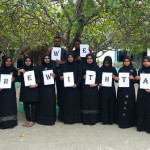Alison Warnock is a 24 year old from Edinburgh, Scotland. She describes herself as “a very over-enthusiastic Scottish girl” and says she absolutely loves the Maldives.
She is starting her second year teaching at Jalaluddin School in Kulhudhuffushi Island in Haa Dhaalu Atoll, in the upper-north province, as part of the International Volunteer’s Program (IVP).
She was working at a cancer charity in Scotland when her friend Sarah, who was also a volunteer in 2009, heard about the IVP. She asked Sarah if she could come along for the interview and got the job. Alison “saw what an incredible opportunity it was and took it.”
Her friends and family were all very excited about her coming, and some of them were slightly jealous. She says “there’s a misconception that every single island will look like the resort islands, with houses on stilts in the water and long, white sandy beaches.”
Even though she knew there would be some home comforts that she would miss, she packed her bags and flew half-way around the world.
Coming to Kulhudhuffushi
Alison arrived in the Maldives in May 2009 and taught until November of the same year. She then went home for five weeks and returned to the Maldives in January 2010.
Coming from a city like Edinburgh to a small island like Kulhuduffushi would be a great challenge for many people, but Alison says she “thrives in small communities”. She attended St. Andrew’s University, a soon-to-be 600 year old university in Scotland, which has “about 3,000 people less than the island.”
“I’m quite used to the small community feel where everybody knows your name. I like knowing where everything is and who everybody is. I love being in small communities, especially when everybody is so welcoming and friendly and everything is so beautiful.”
She says the entire community has been very supportive of her.
“If my washing machine isn’t working or I don’t know how to cook something, they all help me.” She says she never feels alone.
She is picking up some Dhivehi, but says she can understand a lot more than she can speak.
“My accent doesn’t help,” she says with a giggle, “it makes words sound completely wrong, and sometimes it just means a completely different thing.”
Her neighbour finds Alison “hilarious” and they have bilingual conversations in the mornings.
Jalaluddin School
Alison is currently teaching three biology classes at Jalaluddin School: two grade 9 classes and one grade 10 class. One of her grade 9 classes is one she also taught last year, and she says they work like a “well-oiled machine” now: “I’m getting used to them and they’re getting used to me.”
The school’s head of department gave her an “idea of what needs to be taught and over what time-frame” at the beginning of the term. The departments then have weekly meetings where they discuss what the students have been learning.
“You can’t choose what to teach, but you have freedom to do it in whatever way you want,” she says, adding that her students enjoy films and slideshows. She’s teaching them about the heart this week.
The program has provided her with everything she needs and she says “even the things I didn’t think I would need I can get easily on the island.”
The school went on a science trip once, and Alison says it was nice to be around her students in a non-classroom environment which allowed her to get to know them better.
“Everybody is really friendly, and we have been on some really nice staff trips. They have been some of the best days here for me, going on picnics to uninhabited islands.”
Home Sickness?
Alison has travelled to Canada and Thailand, among other places, but she has never been away from home for so long. “I’m really enjoying it, it’s an amazing country, it’s wonderful.”
The school organised a house for her, with bright purple and aqua walls, which is less than a five minute bicycle ride from the school.
“The house is so uplifting: I never feel depressed,” she says.
Although every now and then she gets a craving for something (unhealthy) to eat from back home, “some ice cream or chocolate or popcorn,” she says she loves Maldivian food. “It’s so healthy and tasty; just looking at my skin I can see how good the food is for me.”
Alison also tutors a girl after class and says the girl’s mother has just about adopted her. “She’s always checking up on me and she gives me dinner.”
Alison says she’s very lucky that the school has really good internet access.
“The internet just makes the world so much smaller. I can keep in touch with everyone,” she says. She speaks to her parents every Friday so she doesn’t “feel so far away.”
She loves the lifestyle, the colours, the food, the weather, the view, and her job. And she says if she ever gets stressed, she just has to walk 500 feet and she’s at a spectacular beach: “What’s not to like?”
Alison will continue to teach until November this year, when she will decide whether or not to renew her contract for a third year. “I don’t know if I will renew it again,” she says. “It’s something about the Maldives, I don’t have to look too far ahead.”
There are currently fourteen other education volunteers in different islands throughout the Maldives working through the IVP.
The International Volunteer’s Program (IVP) began operating in 2009 in a partnership between Friends of Maldives (FOM), the Ministry of Health and Family, the Ministry of Education and the Ministry of Foreign Affairs. It is coordinated principally by the Maldivian High Commission in London.
Its intent is to recruit qualified teachers and health professionals from overseas. The education volunteers teach in local schools in small island communities.





